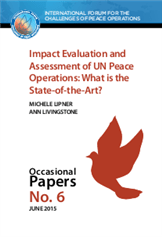OCCASIONAL PAPER NO. 6, JUNE 2015 Impact Evaluation and Assessment of UN Peace Operations: What is the State-of-the-Art?

With more than 123,000 civilian, military and police peacekeepers serving in UN missions around the world, peacekeeping is currently at an all-time high, both in terms of numbers and the breadth and width of mission mandates. And as with any other business, with more investments and investors come more demands for being able to present results, as well as to ensure that there are effective mechanisms in place for capturing and integrating lessons learned in future plans and operations. It is therefore no surprise that increasingly UN Member States and the international community at large call for more accountability and transparency of operations in order to measure the return on their financial and human investments in today’s missions.
This paper provides an overview of the state-of-the-art of assessing and evaluating the impact of peace operations. It is structured to provide a review of current thinking and trends on impact assessment and evaluation of these operations focusing attention on the critical questions of what should we be measuring and at what level; it includes a substantive discussion on the technical aspects of defining terms common to
the discourse, but not commonly accepted in practice. The paper continues with a section attentive to the methodology for carrying out measuring impact and includes illustrative tables of methodologies and approaches currently used by policy-makers and practitioners to measure the impact of peace operations. The paper concludes with a discussion of lessons captured and good practices, offering a number of guidance points
for assessing and evaluating the impact of peace operations.
Michele Lipner has over 20 years experience in the international aid sector, providing senior level management to UN and NGO programs, focused on disaster, humanitarian and development assistance and peacebuilding. More recently, she has also held positions and undertaken consultancies focusing on doctrine development and promotion of good practices in civil-military-police coordination in disaster response and conflict management, evaluation and assessment of peace operations, security sector reform and strengthening NGO effectiveness through sector professionalisation.
Ann Livingstone served for eleven years as the Vice-President for the Pearson Peacekeeping Centre, after a successful academic career that spanned 27 years focused on conflict analysis and post-conflict transitions. She is currently a Senior Consultant with NGOs, regional organisations and institutes focusing on doctrine development in rule of law and impact assessment and evaluation, as well facilitating needs assessments focused on strategic planning and building organisational infrastructure.

